|
|
|
Sort Order |
|
|
|
Items / Page
|
|
|
|
|
|
|
| Srl | Item |
| 1 |
ID:
087058
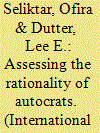

|
|
|
|
|
| Publication |
2009.
|
| Summary/Abstract |
In 1960, Thomas Schelling warned that.. petty dictators may soon have the ability to startle us out wits with a nuclear explosion somewhere.Although nearly a half-century has passed since Schelling wrote those words, the anxiety which they reflect is undiminished, especially concerning autocratic rulers of rogue states.
|
|
|
|
|
|
|
|
|
|
|
|
|
|
|
|
| 2 |
ID:
149779
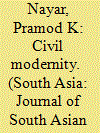

|
|
|
|
|
| Summary/Abstract |
This essay argues that etiquette books produced during the period 1880–1930 sought to contain the increasingly Westernised and cosmopolitan colonial subject by creating a regime of respectability and civility. These books formulated norms of social interaction, imparting advice on rational, hierarchic behaviour and cultural literacy. This discourse of civility was a mode of ameliorating the threat of the hybridised colonial subject by framing his cultural and social interactions within very particular modes of conduct while retaining the hierarchies necessary for imperial dominance.
|
|
|
|
|
|
|
|
|
|
|
|
|
|
|
|
| 3 |
ID:
150894
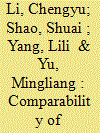

|
|
|
|
|
| Summary/Abstract |
Du and Lin (2015) argued that the estimation model of the economy-wide energy rebound effect proposed by Shao et al. (2014) should be revised and provided an alternative approach, which they considered to be more consistent with the definition of the rebound effect. However, in this comment, we do not find a valid correction or modification to our original model, because their criticism logic does not originate from the corresponding mechanism in Shao et al. (2014), and their estimation formula has a different benchmark with ours. Moreover, their data samples were also different from ours, generating the incomparable results, and there are some irrational results in the comment. Even based on different estimation formulas in the two studies and using the same estimation method and data sample, the comparison results show that the problem of the estimation formula in our previous study which they claimed does not really exist. We argue that this comment is not consistent with the principle of the rebound effect. Actually, their work can be only regarded as proposing an alternative approach for the estimate of the rebound effect. Therefore, their argument is not enough to overturn our previous study.
|
|
|
|
|
|
|
|
|
|
|
|
|
|
|
|
| 4 |
ID:
152485
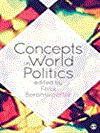

|
|
|
|
|
| Publication |
London, Sage, 2016.
|
| Description |
xii, 326p.pbk
|
| Standard Number |
9781446294277
|
|
|
|
|
|
|
|
|
|
|
|
Copies: C:1/I:0,R:0,Q:0
Circulation
| Accession# | Call# | Current Location | Status | Policy | Location |
| 059019 | 327.1/BER 059019 | Main | On Shelf | General | |
|
|
|
|
| 5 |
ID:
156244
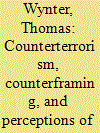

|
|
|
|
|
| Summary/Abstract |
Research on post-9/11 counterterrorism policy preferences in the West has focused primarily on the role of emotions and the magnitude of threat perception. In this article, I demonstrate the central role played by perceptions of the nature of the terrorist threat. Specifically, I focus on the divergence between the dominant depiction of terrorist irrationality in elite discourse in Australia and the strategic model in the academic literature. Reporting on the results of a randomized survey-experiment (N = 803), I find that exposure to excerpts from the academic literature significantly increases perceptions of terrorist rationality. Perceptions of terrorist rationality, in turn, correlate with lower levels of support for military responses to terrorism. While exposure to descriptive text about a terrorist attack increases support for military responses to terrorism, subsequent exposure to excerpts from the academic literature mitigates this effect, reducing support for military responses to terrorism.
|
|
|
|
|
|
|
|
|
|
|
|
|
|
|
|
| 6 |
ID:
073573
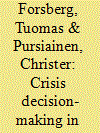

|
|
|
|
|
| Publication |
2006.
|
| Summary/Abstract |
This article reviews 17 Finnish crises since the Second World War from a perspective of three sets of questions derived from the theoretical literature. The questions deal with the construction of crisis, formation of the decision-making unit and rationality of decision-making. Although it is not possible to find a fully regular pattern of a particular type of crisis behaviour, some general observations can be made. In Finland, decision-making is often left in the hands of a small elite group, except in the case of civilian emergencies when key decisions are made at the operational level. The political elite, including the business community, have been fairly united and have rejected critical opinions during a crisis. Yet, contrary to some assumptions about the government using 'crisis' as a vehicle for acquiring more power, Finns generally avoid defining difficult situations as a 'crisis', instead reacting to them cautiously rather than in panic.
|
|
|
|
|
|
|
|
|
|
|
|
|
|
|
|
| 7 |
ID:
127002
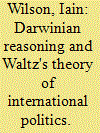

|
|
|
|
|
| Publication |
2013.
|
| Summary/Abstract |
There are important parallels between the pattern of inference Kenneth Waltz uses in his Theory of International Politics and early Darwinian reasoning. This early Darwinian thinking has needed to be significantly refined by modern evolutionary biologists, and their amendments are equally relevant to Waltz's model. Waltz allows for states to imitate each other and also accepts that they are only rarely eliminated from the system. Modern Darwinian analyses show that where elimination is rare and imitation is common, it is quite possible for deleterious behaviours to become widespread. We cannot assume an anarchic system will select for security-enhancing behaviours in major powers. Thinking about Waltz's argument in these terms opens space to disagree with his conclusions while respecting the strength of his logic.
|
|
|
|
|
|
|
|
|
|
|
|
|
|
|
|
| 8 |
ID:
075802
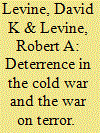

|
|
|
|
|
| Publication |
2006.
|
| Summary/Abstract |
We are grateful to Martin McGuire for guidance and to the National Science Foundation (Grant SES?03?14713) for financial support. We examine how the theory of deterrence differs from a Cold?War type of setting to a War?on?Terror type of setting. Our central conclusion is that deterrence of terrorist states should resemble Cold War deterrence. Deterring terrorist groups is more difficult. In either case, failure of deterrence will have far less traumatic consequences than during the Cold War, unless we ourselves are overcome by fear.
|
|
|
|
|
|
|
|
|
|
|
|
|
|
|
|
| 9 |
ID:
046016


|
|
|
|
|
| Publication |
Cambridge, Cambridge University Press, 2003.
|
| Description |
xx, 330p.
|
| Standard Number |
0521529697
|
|
|
|
|
|
|
|
|
|
|
|
Copies: C:1/I:0,R:0,Q:0
Circulation
| Accession# | Call# | Current Location | Status | Policy | Location |
| 047025 | 355.0217/MOR 047025 | Main | On Shelf | General | |
|
|
|
|
| 10 |
ID:
145170
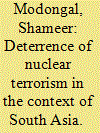

|
|
|
|
|
| Summary/Abstract |
Stability among the great powers during the Cold War is widely theorized in terms of nuclear deterrence. Rationality of States and their preference for survival are the basis of nuclear deterrence. The rationality of non-state terrorist groups is different from that of nation-states. Even though they are also rational actors with their own hierarchy of preferences, survival may not be their ultimate goal. Deterrence of nuclear terrorism is therefore different from deterrence against states. South Asia is more vulnerable to nuclear terrorism than any other region of the world for many reasons. This article analyzes the possibility of nuclear terrorism and the ways of deterrence against it in the context of South Asia.
|
|
|
|
|
|
|
|
|
|
|
|
|
|
|
|
| 11 |
ID:
148354
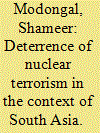

|
|
|
|
|
| Summary/Abstract |
Stability among the great powers during the Cold War is widely theorized in terms of nuclear deterrence. Rationality of states and their preference for survival are the basis of nuclear deterrence. The rationality of non-state terrorist groups is different from that of nation-states. Even though they are also rational actors with their own hierarchy of preferences, survival may not be their ultimate goal. Deterrence of nuclear terrorism is therefore different from deterrence against states. South Asia is more vulnerable to nuclear terrorism than any other region of the world for many reasons. This article analyzes the possibility of nuclear terrorism and the ways of deterrence against it in the context of South Asia.
|
|
|
|
|
|
|
|
|
|
|
|
|
|
|
|
| 12 |
ID:
085454
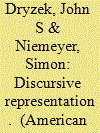

|
|
|
| 13 |
ID:
187067


|
|
|
|
|
| Summary/Abstract |
Various studies conducted in recent years have found that in many cases, consumer behaviour in the US does not correspond with assumptions associated with rational behaviour. One of the areas examined in this context is the impact of the zero price. This article takes two experiments that examined the zero price effect in the US and repeats them in Israel to check if Israeli consumer behaviour in this field is similar to that of American consumers. The results show that at least in terms of the zero price effect, Israeli consumer behaviour differs from that of American consumers: while American consumers are greatly influenced by the opportunity to receive free products, Israeli consumers are far less influenced by the opportunity to receive free items.
|
|
|
|
|
|
|
|
|
|
|
|
|
|
|
|
| 14 |
ID:
161741


|
|
|
|
|
| Summary/Abstract |
Alexander J. Field (2014, 54) argues that game theory “offers little guidance, normatively or predictively, in thinking about behavior or strategy in a world of potential conflict.” He makes this claim by attributing to John von Neumann a view of the superpower relationship during the Cold War period that has no basis in fact and inferring policy prescriptions to that view that are simply not there. Field also suggests that Thomas Schelling's explanation of the “event that didn't occur” leads to the conclusion that “deterrence works because we are human, not because we are entirely rational” (Field 2014, 86). In this essay I show that there is at least one logically consistent game-theoretic explanation of the absence of a nuclear war during the long-peace of the 1950s and early 1960s. I also demonstrate that Field's assumptions lead to exactly the opposite conclusions; that is, that mutual deterrence can in fact be reconciled with rationality and that game theory is a powerful tool for understanding interstate conflict.
|
|
|
|
|
|
|
|
|
|
|
|
|
|
|
|
| 15 |
ID:
130947
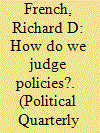

|
|
|
|
|
| Publication |
2014.
|
| Summary/Abstract |
Political science has paid scant attention to the way that citizens judge public policy, assuming that citizens do so, or should do so, in ways familiar to academics themselves, depending upon which of the various schools of thought they endorse. This paper argues that approaching citizens' judgement realistically requires attention to political psychology. Indeed, our conception of citizen judgement can be enriched by attention to research and theory in cognitive psychology and neuroscience. That work emphasises that much judgement occurs spontaneously and very rapidly, that it is involuntary and non-semantic and that it depends upon the emotional impact of experience rather than conscious weighing of situations against explicit standards of assessment such as science, self-interest or moral theory. A moral psychology for public life is sketched out, with implications for judgment by politicians.
|
|
|
|
|
|
|
|
|
|
|
|
|
|
|
|
| 16 |
ID:
193264


|
|
|
|
|
| Summary/Abstract |
This World Affairs 2023 special issue contains six contributions, including this one, exploring some of the key political consequences of traditional beliefs such as magic and superstition in the developing societies of the Global South as well as in certain industrially advanced societies of the Global North. To show why traditional beliefs matter, we provide an explanation in this introduction for why traditional beliefs exist in developing countries, why they survive in developed countries, and why they may become more popular over time. By utilizing a simple game theoretic approach, we explain why rational people can sometimes increase their payoffs by subscribing to a superstition while superstitious people never gain by switching to rationality. In fact, the superstition—which has no causal connection with the natural course of events—may even yield better results, not only for the individual but also for the group. This is the reason why, in the framework of evolutionary stable equilibrium, superstitious people can demographically dominate an entire population over time. In addition to explaining the existence and the persistence (or the popularity) of traditional beliefs, we highlight the key findings presented in the articles included in this special issue. All of them underline a cardinal point: traditional beliefs matter. They shape electoral behavior, they shape attitudes toward democratic governance, and they influence voters’ assessment of political figures and historical events. Precisely because traditional beliefs have such extensive implications for a country's political life, we believe that in the future scholars will have to pay greater attention to such beliefs to have a better understanding of political phenomena and trends.
|
|
|
|
|
|
|
|
|
|
|
|
|
|
|
|
| 17 |
ID:
140169


|
|
|
|
|
| Summary/Abstract |
This article offers the first disaggregated, quantitative comparison of Islamist and nationalist violence, using new data from Russia's North Caucasus. We find that violence by Islamist groups is less sensitive to government coercion than violence by nationalist groups. Selective counterinsurgency tactics outperform indiscriminate force in suppressing attacks by nationalists, but not Islamists. We attribute this finding to rebels’ support structure. Because Islamist insurgents rely less on local support than nationalists, they are able to maintain operations even where it is relatively costly for the local population to support them. These findings have potentially significant implications for other contemporary conflicts in which governments face both types of challenges to their authority and existing political order.
|
|
|
|
|
|
|
|
|
|
|
|
|
|
|
|
| 18 |
ID:
114691


|
|
|
|
|
| Publication |
2012.
|
| Summary/Abstract |
The goal of this article is to challenge the assumption of rationality in the behavior of decision-making units involved in security, defense, intelligence and warfare and to consider the influence of "motivated bias" in such instances. A review of motivational literature within international politics and a discussion of literature applying "motivated biases" to warfare and strategic surprise will offer an alternative view of the primacy of rationality in such decisions.
|
|
|
|
|
|
|
|
|
|
|
|
|
|
|
|
| 19 |
ID:
114925
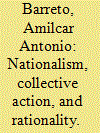

|
|
|
|
|
| Publication |
2012.
|
| Summary/Abstract |
Since Olson's free-rider paradox, scholars have questioned the applicability of rational choice analyses to the study of nationalism and other forms of collective action. The most heated debates have centered on the participation of ordinary group members rather than elites. Leaders lack the material resources to adequately remunerate grassroots activists for their exploits or to individually punish defectors. This article posits that the problem lies not with the strategic thinking of nonelites but with the way rationality has been conceptualized in the scholarly literature. We should challenge the standard assumption that rational behavior is limited to accruing material rewards. This article will reexamine this conjecture in light of alternative interpretations underscoring that individuals endeavor to maximize nonmaterial utilities.
|
|
|
|
|
|
|
|
|
|
|
|
|
|
|
|
| 20 |
ID:
177785
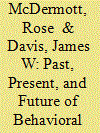

|
|
|
|
|
| Summary/Abstract |
Originally developed by applying models from cognitive psychology to the study of foreign policy decision making, the field of behavioral IR is undergoing important transformations. Building on a broader range of models, methods, and data from the fields of neuroscience, biology, and genetics, behavioral IR has moved beyond the staid debate between rational choice and psychology and instead investigates the plethora of mechanisms selected by evolution for solving adaptive problems. This opens new opportunities for collaboration between scholars informed by rational choice and behavioral insights. Examining the interactions between the individual's genetic inheritance, social environment, and downstream behavior of individuals and groups, the emerging field of behavioral epigenetics offers novel insights into the methodological problem of aggregation that has confounded efforts to apply behavioral findings to IR. In the first instance empirical, behavioral IR raises numerous normative and philosophical questions best answered in dialogue with political and legal theorists.
|
|
|
|
|
|
|
|
|
|
|
|
|
|
|
|
|
|
|
|
|